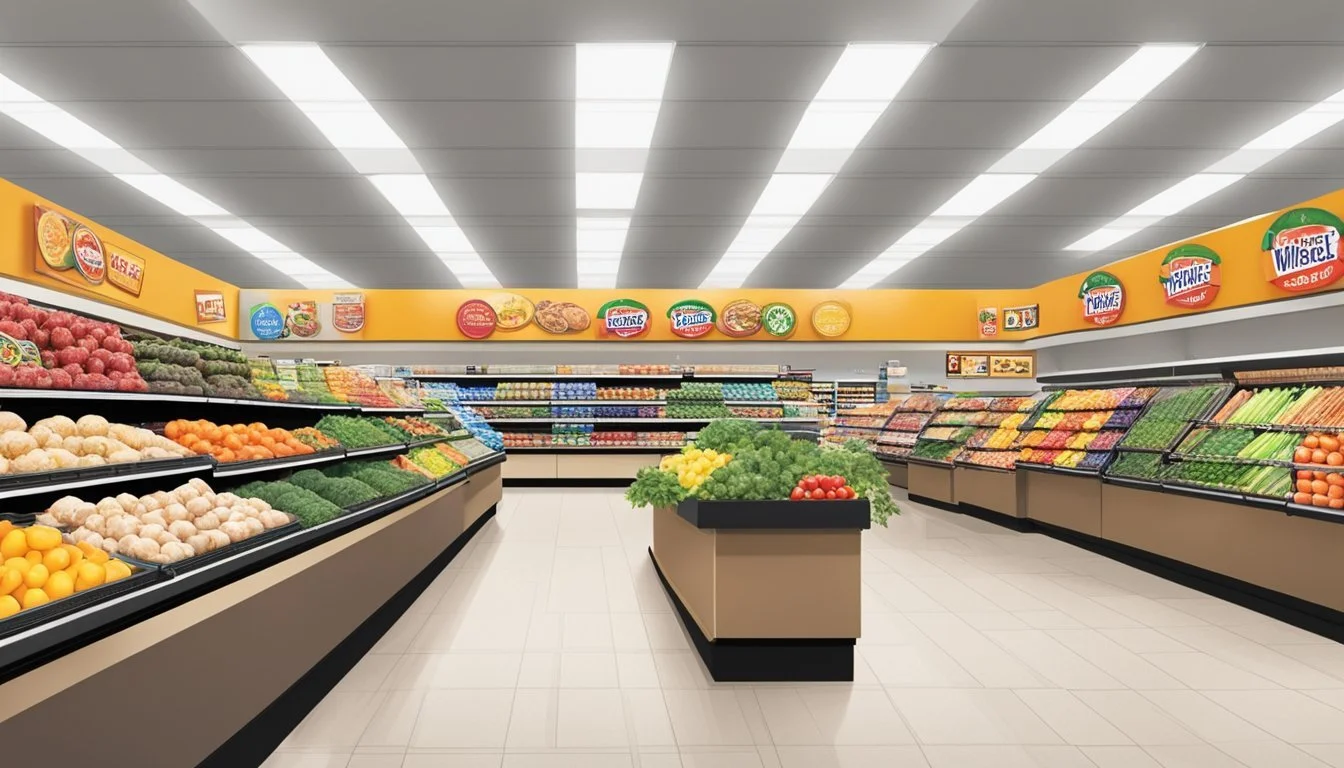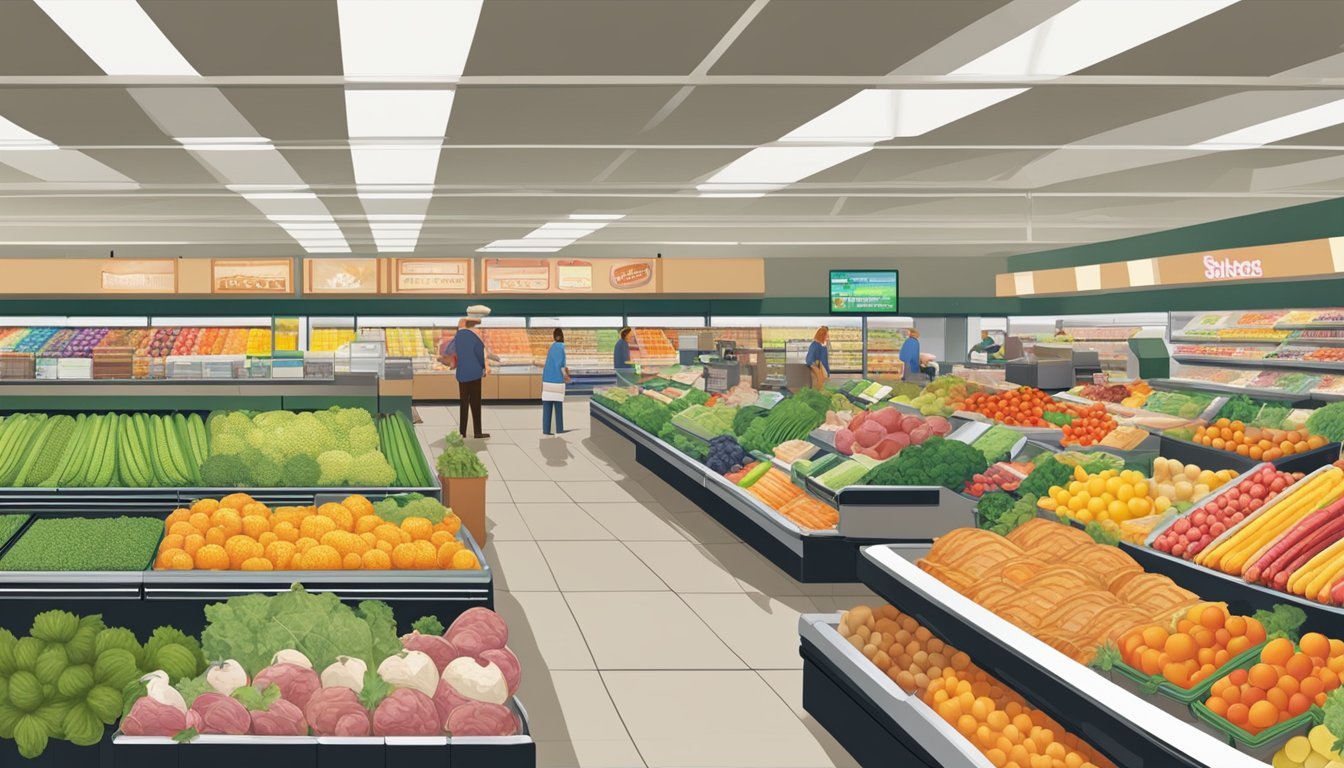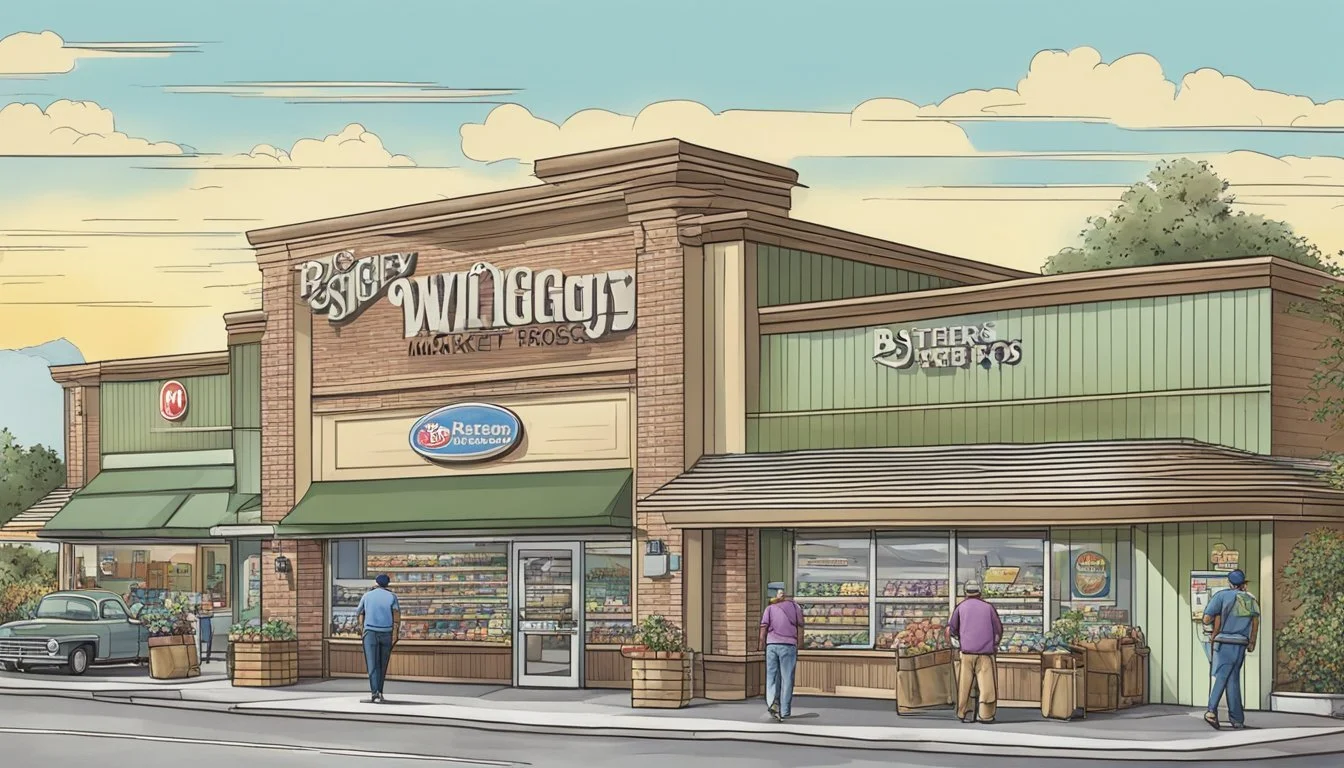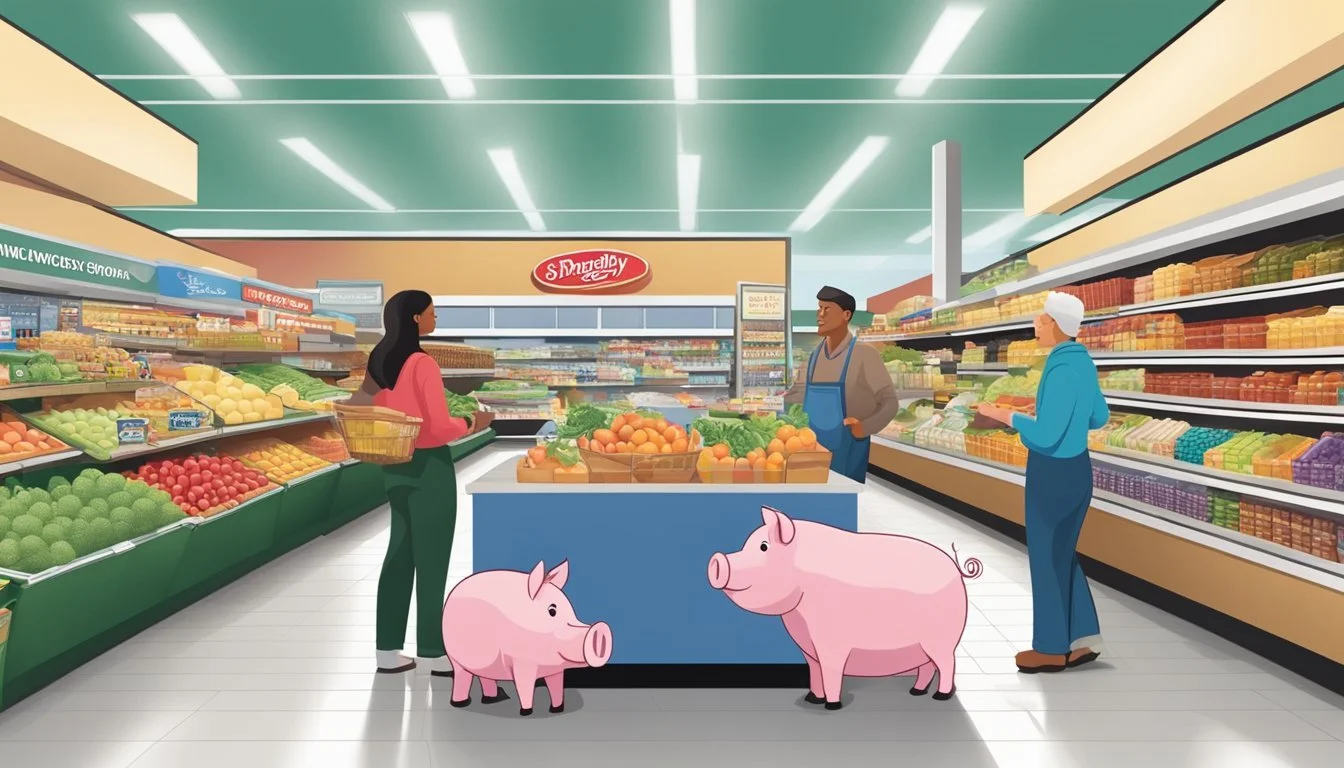Piggly Wiggly vs Stater Bros. Markets
A Comprehensive Comparison of Price, Quality, and Selection
Grocery shopping can be a personal experience, with many factors influencing where customers choose to fill their carts. Two popular regional chains, Piggly Wiggly and Stater Bros. Markets, have earned loyal followings in their respective areas.
Piggly Wiggly, founded in 1916, is credited with pioneering the self-service grocery model. The chain operates primarily in the Southern and Midwestern United States, offering a local touch and often catering to regional tastes. Stater Bros. Markets, established during the Great Depression, has grown to become a significant presence in Southern California.
While both chains have their strengths, Stater Bros. Markets generally receives higher marks for overall customer satisfaction, product quality, and competitive pricing. However, the best choice ultimately depends on individual preferences and location. Piggly Wiggly's charm and historical significance may appeal to those seeking a more personalized shopping experience, while Stater Bros. Markets' larger selection and consistent performance attract customers looking for a reliable, well-stocked supermarket.
History and Evolution of the Grocery Chains
Piggly Wiggly and Stater Bros. Markets both have rich histories that shaped the modern grocery shopping experience. These chains introduced innovative concepts and expanded their operations over the decades.
Piggly Wiggly's Origins and Innovations
Clarence Saunders founded Piggly Wiggly in Memphis, Tennessee on September 6, 1916. It was the world's first true self-service grocery store, revolutionizing how people shopped for food.
Saunders introduced several groundbreaking features:
Checkout stands
Individual item pricing
Shopping baskets for customers
These innovations allowed shoppers to browse and select products themselves, eliminating the need for clerks to fetch items. This self-service model reduced labor costs and lowered prices for consumers.
Piggly Wiggly's success led to rapid expansion. By the 1920s, the chain had hundreds of locations across the United States. The company's influence extended beyond its own stores, as other grocers adopted similar self-service formats.
Stater Bros. Market's Growth and Development
Twin brothers Cleo and Leo Stater established Stater Bros. Markets in Yucaipa, California in 1936. The company began as a single store during the Great Depression.
Stater Bros. focused on providing quality products at affordable prices. This approach resonated with customers, leading to steady growth. Key milestones include:
1940s-1950s: Expansion to multiple locations in Southern California
1960s-1970s: Acquisition of several local grocery chains
1980s-present: Continued growth and modernization of stores
The company remained family-owned until 1968 when it became employee-owned. Stater Bros. has since grown into one of the largest privately held supermarket chains in Southern California.
Store Brand and Layout Analysis
Piggly Wiggly and Stater Bros. Markets employ distinct strategies in their store layouts and private label offerings. These elements significantly impact the overall shopping experience and value proposition for customers.
The Aisles and Shopping Environment
Piggly Wiggly stores typically feature a compact layout, fostering a neighborhood feel. The aisles are often narrower, creating an intimate shopping atmosphere. Essential items like bread, milk, and eggs are strategically placed to encourage customers to explore multiple sections.
Stater Bros. Markets opts for a more spacious layout with wider aisles. This design facilitates easier navigation, especially during busy periods. The store environment emphasizes cleanliness and organization, with clear signage guiding shoppers to different departments.
Both chains arrange their products to maximize exposure and encourage impulse purchases. However, Stater Bros. tends to offer a more modern shopping experience with updated fixtures and lighting.
Private Labels and Exclusive Products
Piggly Wiggly's private label, "Piggly Wiggly," covers a wide range of products across various categories. These items often provide a cost-effective alternative to national brands while maintaining acceptable quality standards.
Stater Bros. Markets features its "Stater Bros." brand, which includes an extensive selection of grocery staples, frozen foods, and household items. The chain focuses on offering competitive pricing without compromising on product quality.
Both stores use their private labels to differentiate themselves from competitors. Stater Bros. has been noted for its emphasis on fresh produce and meat departments, often featuring locally sourced options when possible.
Exclusive products in each chain help create customer loyalty. Piggly Wiggly sometimes offers regional specialties, while Stater Bros. may highlight California-grown produce, reflecting its roots in the state.
Product Selection and Quality
Piggly Wiggly and Stater Bros. Markets offer diverse product selections to cater to different customer preferences. Both chains strive to provide quality items across various departments.
Freshness and Organic Offerings
Piggly Wiggly emphasizes fresh produce, sourcing from local farmers when possible. Their stores feature a wide array of fruits and vegetables, with seasonal offerings rotated regularly. Organic options are available, though the selection may be limited compared to specialty grocers.
Stater Bros. Markets also prioritizes produce freshness, often partnering with regional growers. Their organic selection tends to be more extensive, catering to health-conscious shoppers. Both chains implement quality control measures to ensure produce meets their standards.
Meat and Bakery Departments
Piggly Wiggly's meat department offers a range of cuts, including beef, pork, and poultry. Many locations have in-store butchers for custom cuts. Their bakery sections typically feature a mix of pre-packaged goods and freshly baked items.
Stater Bros. Markets is known for its robust meat department, often considered a strong point for the chain. They offer prime cuts and specialty meats. Their bakeries produce a variety of fresh breads, pastries, and custom cakes daily.
Dairy, Frozen Foods, and Packaged Goods
Both chains stock a comprehensive selection of dairy products, including milk, cheese, and yogurt from national and regional brands. Piggly Wiggly's frozen food aisles contain standard offerings, while Stater Bros. Markets may have a slightly larger variety, including more premium frozen meals.
In packaged goods, Stater Bros. Markets often carries a broader range of national brands and specialty items. Piggly Wiggly focuses on staple products and may have a higher proportion of store-brand options. Both stores aim to balance variety with competitive pricing in these categories.
Pricing Strategies and Deals
Piggly Wiggly and Stater Bros. Markets employ distinct pricing approaches to attract and retain customers. Both chains offer competitive prices and various deals, but their strategies differ in key ways.
Everyday Pricing and Value
Piggly Wiggly focuses on providing low prices on everyday essentials. Their "Pig Deals" program highlights weekly specials on popular items. Stater Bros. Markets emphasizes consistent value pricing across their product range.
Stater Bros. uses a "Low Price Guarantee" to match competitors' advertised prices. This policy helps maintain their reputation for affordability.
Piggly Wiggly often features regional products at competitive prices, appealing to local tastes. Their smaller store format can sometimes lead to slightly higher prices on certain items compared to larger chains.
Sales, Coupons, and Digital Deals
Both chains offer weekly sales circulars with discounted items. Piggly Wiggly's "Pig of the Week" spotlights deep discounts on select products.
Stater Bros. Markets provides digital coupons through their mobile app. Customers can clip coupons and save them to their loyalty account for easy redemption at checkout.
Piggly Wiggly accepts manufacturer coupons and occasionally offers store-specific coupons. Some Piggly Wiggly locations participate in double coupon promotions, doubling the value of manufacturer coupons up to a certain amount.
Stater Bros. frequently runs "Mix and Match" deals, allowing customers to save when purchasing multiple items from specific categories.
Customer Service and Shopping Experience
Piggly Wiggly and Stater Bros. Markets prioritize customer satisfaction through different approaches. Their strategies impact checkout efficiency, staff interactions, and available amenities.
Checkout Efficiency and Staff Helpfulness
Piggly Wiggly emphasizes a personalized touch. Many locations feature friendly cashiers who engage in small talk with customers. This can create a warm atmosphere but may slow down checkout times during busy periods.
Stater Bros. Markets focuses on speed and efficiency. They often have more checkout lanes open and utilize self-checkout options in many stores. This approach can reduce wait times, especially during peak hours.
Both chains train their staff to assist customers with product locations and inquiries. Piggly Wiggly employees tend to know regular customers by name in smaller communities. Stater Bros. staff are generally knowledgeable about store layouts and current promotions.
Store Amenities and Services
Piggly Wiggly offers a range of in-store services tailored to local needs. Many locations provide:
Money orders
Bill payment services
Coin counting machines
Basic pharmacy services
Stater Bros. Markets typically feature:
Full-service delis with prepared meals
Extensive bakery departments
Pharmacies in select locations
Digital coupons through their mobile app
Stater Bros. invests in modern store designs with wider aisles and clear signage. Piggly Wiggly stores vary more in layout and amenities, reflecting their franchise model. Both chains offer carry-out assistance, though Stater Bros. tends to have more consistent availability of this service across its locations.
Grocery Chain Presence and Locations
Piggly Wiggly and Stater Bros. Markets have distinct regional footprints across the United States. Their store locations and community presence play a significant role in their market positioning and customer reach.
Regional Footprint and Store Count
Piggly Wiggly operates primarily in the Southeastern and Midwestern United States. The chain has over 530 stores spread across 17 states. States with a strong Piggly Wiggly presence include Alabama, Georgia, and South Carolina.
Stater Bros. Markets focuses exclusively on Southern California. The company maintains 171 supermarkets throughout the region. Its stores are concentrated in San Bernardino, Riverside, Los Angeles, and Orange counties.
Accessibility and Community Integration
Piggly Wiggly stores are often found in smaller towns and rural areas. This positioning allows the chain to serve communities that larger retailers might overlook. Many Piggly Wiggly locations operate as independently owned franchises, enabling local owners to tailor their offerings to community needs.
Stater Bros. Markets has deep roots in Southern California communities. The company emphasizes local involvement and often participates in community events. Stater Bros. stores are typically located in suburban areas, providing convenient access for residents.
Both chains prioritize customer convenience, but their approaches differ due to their distinct regional focuses. Piggly Wiggly's wider geographic spread contrasts with Stater Bros.' concentrated presence in a single region.
Technological Integration and Innovations
Piggly Wiggly and Stater Bros. Markets have embraced technology to enhance the shopping experience. Both chains have implemented various digital tools and automated systems to streamline operations and cater to evolving consumer preferences.
Online Shopping and Delivery Services
Piggly Wiggly offers online shopping through select locations, allowing customers to browse products and place orders for pickup or delivery. The service includes digital coupons and personalized recommendations based on shopping history.
Stater Bros. Markets has partnered with Instacart to provide same-day delivery and pickup options. Customers can shop via the Stater Bros. website or mobile app, accessing a wide range of products and exclusive online deals.
Both chains have invested in improving their e-commerce platforms to compete with larger retailers and meet the growing demand for convenient shopping options.
Self-Service Technologies and Checkout
Piggly Wiggly, known for pioneering the self-service grocery store concept, continues to innovate in this area. Many locations feature self-checkout kiosks, reducing wait times and giving customers more control over their shopping experience.
Stater Bros. Markets has also implemented self-checkout options in numerous stores. The chain has tested advanced technologies like mobile scan-and-go systems, allowing customers to scan items with their smartphones as they shop.
Both retailers have explored digital shelf labels and smart cart technologies to enhance in-store navigation and provide real-time pricing information. These innovations aim to create a more efficient and user-friendly shopping environment.
Brand Reputation and Market Position
Piggly Wiggly and Stater Bros. Markets have established distinct brand identities in their respective markets. Both chains have cultivated loyal customer bases through their unique approaches to grocery retailing.
Customer Loyalty and Brand Perception
Piggly Wiggly, founded in 1916, holds a special place in American retail history as the first self-service grocery store. This legacy contributes to its nostalgic appeal and brand recognition, particularly in the South and Midwest.
Piggly Wiggly stores have maintained strong customer loyalty despite increasing competition. The chain's cost-plus concept and community-focused approach have helped it retain a dedicated following.
Stater Bros. Markets, primarily operating in Southern California, has built a reputation for quality products and customer service. The company's commitment to its local communities has fostered a positive brand perception.
Comparative Analysis with Competitors
In their respective markets, both Piggly Wiggly and Stater Bros. face competition from larger national chains and discount retailers. Piggly Wiggly has shown resilience against encroaching competitors like Walmart and Lidl.
Stater Bros. Markets competes effectively in the competitive Southern California market. The chain's focus on fresh produce and meat departments sets it apart from some discount-oriented competitors.
Both chains have carved out distinct niches. Piggly Wiggly's franchise model allows for local adaptation, while Stater Bros.' regional focus enables tailored offerings for its market.
Consumer Reports and industry analyses generally regard both chains favorably for their customer service and product quality, though they may not always match the prices of larger discount chains.
Consumer Trends and Preferences
Shoppers today prioritize health-conscious options and affordability when selecting a grocery store. Their preferences shape product offerings and pricing strategies at both Piggly Wiggly and Stater Bros. Markets.
Health Consciousness and Product Range
Piggly Wiggly and Stater Bros. Markets have expanded their organic and natural food sections to meet growing demand. Both stores now stock more whole grains, fresh produce, and plant-based alternatives.
Piggly Wiggly offers an extensive product range including dry goods, canned items, and specialty foods. Their selection caters to various dietary needs and preferences.
Stater Bros. Markets has increased its selection of locally-sourced products. This appeals to customers seeking fresher options and those wanting to support regional producers.
Both chains have improved their prepared foods sections. They now feature healthier grab-and-go meals and salad bars to accommodate busy shoppers looking for nutritious convenience items.
Budget Concerns and Shopping Patterns
Price-conscious consumers influence the strategies of both Piggly Wiggly and Stater Bros. Markets. Each store aims to provide value through competitive pricing and promotions.
Piggly Wiggly focuses on customizing its stock to local preferences. This approach helps reduce waste and keeps prices lower for budget-minded shoppers.
Stater Bros. Markets emphasizes its loyalty program. Members receive personalized discounts and earn points on purchases, appealing to cost-savvy customers.
Both chains have enhanced their private label offerings. These store-brand products provide quality alternatives at lower price points, addressing budget concerns.
Digital coupons and mobile apps have become increasingly popular. Piggly Wiggly and Stater Bros. Markets have adapted by offering digital savings options to tech-savvy, deal-seeking customers.









